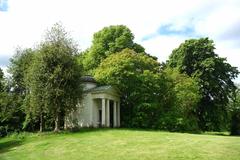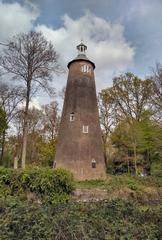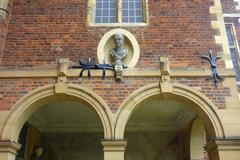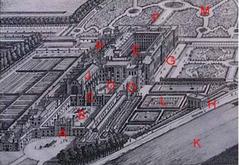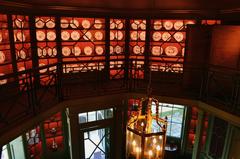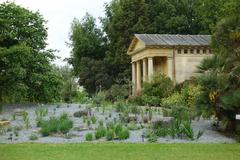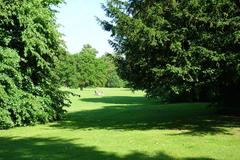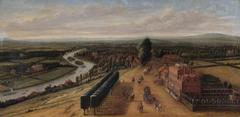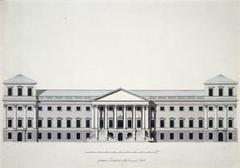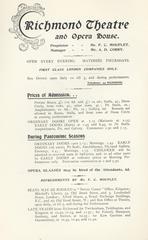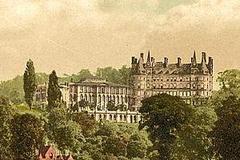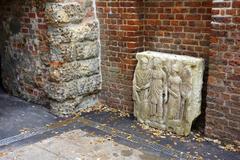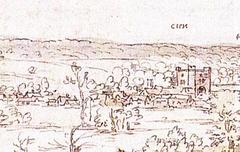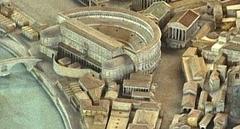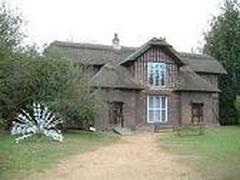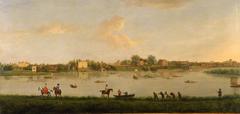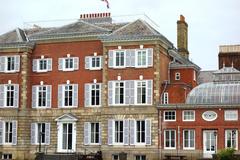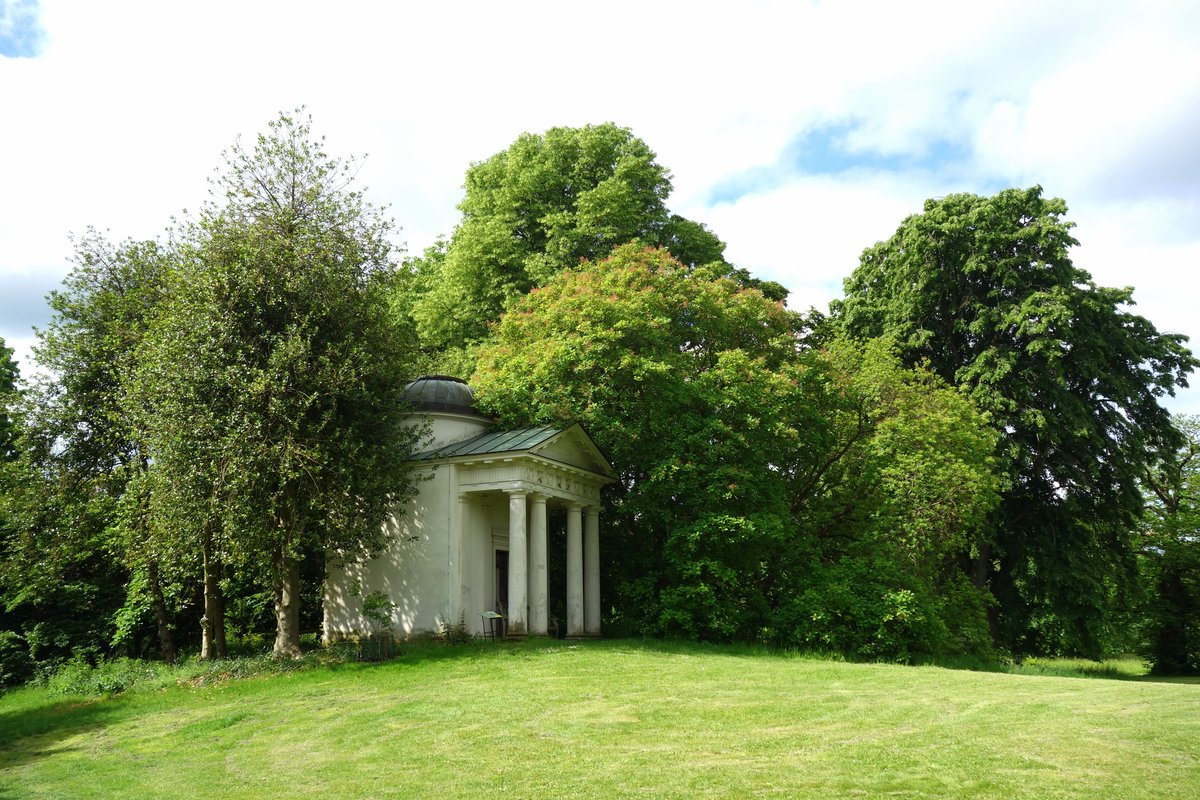
Temple of Bellona Richmond: Visiting Hours, Tickets, and Historical Site Guide
Date: 14/06/2025
Introduction
The Temple of Bellona, an elegant 18th-century neoclassical folly, is nestled within the verdant expanse of Kew Gardens in Richmond, United Kingdom. Designed by Sir William Chambers in 1760, this Grade II listed structure stands as both a testament to Britain’s enduring fascination with classical antiquity and a commemoration of military valor during the Seven Years’ War. Its striking architectural features, historical associations, and tranquil garden setting make it a must-see for history enthusiasts, architecture lovers, and casual visitors alike (Kew Art and Architecture Trail; Historic England Listing).
This guide provides a comprehensive overview of the Temple of Bellona, including its origins, cultural significance, architectural highlights, practical visitor information, and tips for making the most of your visit to this unique Richmond historical site.
Contents
- Origins and Historical Context
- Architectural Features and Symbolism
- Bellona in Roman and British Cultural Imagination
- The Temple’s Role in Kew Gardens
- Visiting Information: Hours, Tickets & Travel Tips
- Accessibility and Facilities
- Nearby Attractions & Suggested Itineraries
- Visitor Tips and Etiquette
- Preservation and Community Engagement
- Frequently Asked Questions (FAQ)
- Conclusion and Recommendations
- Sources and Further Reading
Origins and Historical Context
Commissioned under the patronage of Princess Augusta and Prince Frederick, the Temple of Bellona was conceived as part of a broader collection of ornamental garden follies in Kew. Chambers, renowned for his mastery of neoclassical design, crafted the temple in 1760 to reflect the era’s intellectual curiosity and the British elite’s affinity for Roman mythology (Kew Art and Architecture Trail).
The temple’s dedication to Bellona, the Roman goddess of war, signified more than mere aesthetic inspiration—it was a symbolic gesture linking British military aspirations and achievements to those of ancient Rome. The temple was later relocated within the gardens around 1803, adapting to evolving landscape designs.
Architectural Features and Symbolism
The Temple of Bellona exemplifies neoclassical garden architecture with its:
- Whitewashed stucco façade
- Portico supported by Doric columns
- Metope frieze pediment
- Oval domed roof
- Medallions commemorating British and Hanoverian regiments from the Seven Years’ War
Inside, a single domed chamber with classical motifs offers a serene space for contemplation. The integration of regimental names from a pivotal period in British history transforms the folly into a subtle memorial (Historic England Listing).
Bellona in Roman and British Cultural Imagination
Bellona, in Roman mythology, was revered as the personification of war and a protector of the state. Temples dedicated to her in ancient Rome were centers of both religious ritual and military deliberation (Old World Gods: Bellona; Roman Mythology Worldwide). In 18th-century Britain, invoking Bellona’s image allowed garden designers and patrons to align themselves with classical virtues of courage and patriotism.
The Temple of Bellona at Kew thus serves as a bridge between ancient ideals and contemporary British identity, reflecting Enlightenment values and the symbolism of martial prowess.
The Temple’s Role in the Landscape of Kew Gardens
Strategically placed within Kew’s picturesque landscape, the Temple of Bellona complements the gardens’ collection of follies and pavilions. Its classical design and martial symbolism offered Georgian visitors a site for thoughtful reflection, reinforcing the gardens’ dual roles as spaces of leisure and learning (Kew Art and Architecture Trail).
Today, it stands alongside architectural highlights like the Pagoda and Marianne North Gallery, contributing to Kew’s status as a UNESCO World Heritage Site.
Visiting Information: Hours, Tickets & Travel Tips
Opening Hours:
Kew Gardens is open daily, generally from 10:00 AM to 7:00 PM in summer and until 5:00 PM in winter (times may vary seasonally). The Temple of Bellona is accessible during regular Kew opening hours (Kew Gardens Official Website).
Tickets:
Entry to the Temple is included with standard Kew Gardens admission:
- Adults: £19.50
- Children (4-16): £6.00
- Concessions and memberships available
Tickets can be purchased online or at the entrance (Kew Gardens Visitor Information).
Getting There:
- By Public Transport: Nearest stations are Kew Gardens (London Overground & District Line) and Richmond Station.
- By Car: Limited parking available; public transport recommended.
- By Bicycle/On Foot: Cycle racks near Kew Gardens; scenic routes along the Thames.
Travel Tips:
Arrive early for a quieter experience and to explore adjacent attractions. The temple is near Kew’s Victoria Gate entrance.
Accessibility and Facilities
- Paths: Paved and wheelchair-accessible routes lead to the temple.
- Restrooms: Accessible facilities are available throughout Kew Gardens.
- Assistance: Guide dogs welcome; staff available at main gates for support.
- Visitor Information: Kew’s information desks provide maps, guides, and accessibility advice.
Nearby Attractions & Suggested Itineraries
Pair your Temple of Bellona visit with:
- Kew Palace and the Royal Kitchens
- Shirley Sherwood Gallery of Botanical Art
- Marianne North Gallery
- Richmond Palace (remnants)
- Richmond Riverside and Thames Path
- Richmond Park
Suggested itinerary: Begin at the Temple, explore Kew’s other historic structures, enjoy a riverside walk, and finish with refreshments in Richmond town center.
Visitor Tips and Etiquette
- Respect the Structure: Do not climb on the Temple or touch delicate features.
- Photography: Permitted for personal use. For commercial use, seek permission.
- Picnics: Permitted on lawns; use bins for litter.
- Footwear: Wear comfortable shoes suitable for walking on grass or uneven paths.
- Weather: Bring an umbrella or raincoat for changeable UK weather (Hand Luggage Only).
Preservation and Community Engagement
The Temple of Bellona’s Grade II listing ensures ongoing preservation efforts, supported by Kew Gardens and community groups. Visitors are encouraged to support conservation by respecting the site, donating, or volunteering (Historic England Listing).
Frequently Asked Questions (FAQ)
Q: What are the Temple of Bellona’s visiting hours?
A: The Temple is accessible during Kew Gardens’ opening hours (typically 10:00 AM–7:00 PM in summer, 10:00 AM–5:00 PM in winter).
Q: Is there an entry fee?
A: Access is included with Kew Gardens admission. Some riverside follies are free to visit; check local notices for specific details.
Q: Is the Temple wheelchair accessible?
A: Yes, paved paths provide access. Some uneven ground may exist in historic areas.
Q: Are guided tours available?
A: Kew Gardens offers guided tours that may include the Temple. Local history groups occasionally organize heritage walks.
Q: Can I take photos?
A: Yes, non-commercial photography is encouraged.
Conclusion and Recommendations
The Temple of Bellona is a remarkable landmark in Richmond’s historic landscape, blending classical inspiration with British heritage. Its architectural elegance, layered symbolism, and tranquil garden setting invite both contemplation and discovery. Take advantage of accessible visitor facilities, pair your trip with other Richmond sites, and immerse yourself in the area’s rich cultural tapestry.
For enhanced experiences, download the Audiala app for guided tours and exclusive insights. Stay up-to-date by following Kew Gardens and local tourism channels on social media.
Sources and Further Reading
- Kew Art and Architecture Trail
- Kew Gardens Official Website
- Richmond Local History Society
- VisitRichmond
- Historic England Listing
- Old World Gods: Bellona
- Roman Mythology Worldwide
